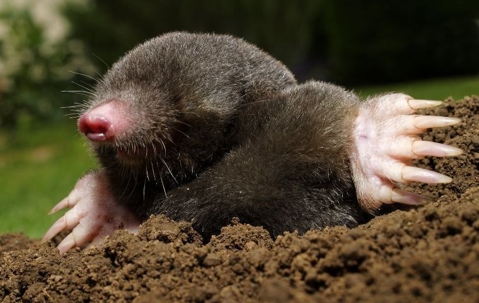Moles are not known to bite humans. They have small, non-functional eyes and tiny ears, which means they primarily rely on their keen sense of touch and their acute sense of smell to navigate and find food. Moles are insectivores, meaning they primarily eat insects, worms, and other invertebrates found in the soil. Their primary focus is on digging tunnels and creating intricate burrow systems underground.
Moles might appear aggressive due to their burrowing behavior, which can sometimes damage lawns, gardens, and crops. However, they are not aggressive toward humans and generally do not pose a direct threat. If you're dealing with mole-related issues such as lawn damage, it's best to contact a professional pest control service. They can assess the situation, provide appropriate recommendations, and help you find solutions to manage mole activity and potential damage to your property. If you're experiencing mole-related problems, feel free to give us a call for expert assistance tailored to your specific situation.
Are Mole Bites Dangerous?
Moles are not considered dangerous to humans in terms of biting. Moles are insectivorous mammals that spend the majority of their lives digging underground tunnels in search of insects and worms. They have small, weak front paws with sharp claws that are well-suited for tunneling through soil and creating intricate burrow systems.
Moles do not have the same biting behavior as other animals like rodents or predators. Their primary focus is on their subterranean lifestyle, and they do not possess the characteristics or tendencies that would make them inclined to bite humans. In fact, due to their limited eyesight and almost complete lack of external ears, moles rely on their highly developed senses of touch and smell to navigate and find food.
If you're experiencing mole-related issues, such as damage to your lawn or garden, it's recommended to seek professional assistance from a pest control service. Their expertise can help you manage mole activity effectively and prevent any potential damage to your property. For personalized advice and solutions, don't hesitate to contact us. We're here to provide comprehensive and thorough assistance for all your pest control needs.
How To Get Rid Of Moles
Getting rid of moles requires a systematic and comprehensive approach to ensure effective removal without causing harm to the environment. Here are some ways you can handle mole infestations:
Identify the Problem: Confirm that you're dealing with a mole infestation and not another type of animal. Moles create distinctive raised tunnels or mounds of soil in your yard.
Professional Assessment: Contact a professional pest control service that specializes in wildlife management. They will assess the extent of the infestation and provide tailored recommendations.
Trapping: One effective method is to use mole traps. These traps are designed to catch moles as they move through their tunnels. However, proper placement and technique are crucial to their success. Professional pest control experts have the expertise to strategically set and monitor traps.
Natural Repellents: Some natural repellents like castor oil-based solutions can make the soil less attractive to moles. However, these methods might have varying levels of effectiveness and can require reapplication.
Habitat Modification: Moles are attracted to moist soil with a high insect population. Improve drainage in your yard to reduce soil moisture, and address any insect issues to make your yard less appealing.
Exclusion Barriers: Installing underground barriers made of wire mesh can prevent moles from accessing specific areas. However, this can be labor-intensive and might not always be practical.
Cultural Practices: Regularly mow your lawn and remove tall vegetation, as moles tend to avoid well-maintained areas. This can help reduce the attractiveness of your yard to moles.
Pet Presence: Dogs and cats might help deter moles due to their natural digging behavior and keen senses. However, this method might not guarantee complete mole removal.
Avoid Harmful Methods: Avoid using toxic chemicals or harmful practices that can negatively impact the environment, other animals, or your own health.
Long-Term Management: Even if you successfully remove moles, new ones might move in. Regular yard maintenance and monitoring are essential for long-term mole management.
For a thorough and professional approach to mole removal, it's recommended to consult with experts in pest control. If you're seeking expert assistance and personalized solutions, feel free to reach out to us. We specialize in effective pest management and can help you address your mole-related concerns comprehensively.

